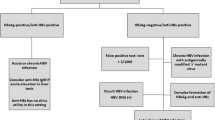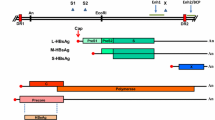Abstract
Background and Objectives
Hepatitis B is a major health concern in Asia. Chronic hepatitis B virus (HBV) infection may cause hepatic cirrhosis and liver cancer. HBV is transmitted horizontally through blood and blood products and vertically from mother to infant. Perinatal infection is the main route of transmission in regions with high prevalence of hepatitis B surface antigen (HbsAg) carriage, and perinatal transmission leads to high rates of chronic infection. Therefore, it is important to prevent mother-to-child transmission (MTCT) of HBV1. The present study aims at comparing the use of antivirals (lamivudine vs tenofovir) in reducing MTCT.
Materials and Methods
A total of 60 HbsAg-positive pregnant women were enrolled in the prospective study to test the efficacy of antiviral (lamivudine vs tenofovir—category B drug) to reduce mother-to-child transmission and monitor hepatitis B viral status in infant. HbsAg-positive pregnant women aged 18–43 years at gestational age between 28 and 32 weeks were followed up. They were tested for HBsAg, liver function test and HBeAg. In whom HbeAg was positive, HBV viral load was tested. Sixty patients with high viral load (>6 log copies/ml) were recruited in the study. Alternate patients were randomized into two groups. Group A comprised 31 subjects treated with lamivudine 100 mg daily starting from 28 to 32 weeks of gestation (third trimester) and continued to 1 month after delivery. Group B comprised 29 pregnant women who were treated with tenofovir 300 mg daily from 28 to 32 weeks of gestation and continued to 1 month post-partum. The newborn babies were given HBIG within 24 h after delivery and HBV vaccines at 0, 1 and 6 months. HBsAg infectivity was tested in the infant at 1 year after birth.
Results
Antivirals, lamivudine/tenofovir treatment in HBV carrier mothers from 28 weeks of gestation along with active and passive immunization of new born may interrupt MTCT of HBV efficiently. Tenofovir, category B drug, is more effective in preventing transmission of HBV infection to infants (p = 0.004).


Similar content being viewed by others
References
Terrault NA, Bzowej NH, Chang K-M, et al. AASLD guidelines for treatment of chronic hepatitis B. Hepatology 2016;63(1):261–83.
Zhang Z, Chen C, Li Z, et al. Individualized management of pregnant women with high hepatitis B virus DNA levels. WJG 20th anniversary special issue (9): hepatitis B virus. World J Gastroenterol. 2014;20(34):12056–61.
Papadakis MA, Elefsiniotis IS, Vlahos G, et al. Intrauterine-transplacental transmission of hepatitis B virus (HBV) from hepatitis B e antigen negative (precore mutant, G1896A) chronic HBV infected mothers to their infants. Preliminary results of a prospective study. J Clin Virol. 2007;38(2):181–3 Epub 2006 Dec 4.
Wiseman E, Fraser MA, Holden S, et al. Perinatal transmission of hepatitis B virus: an Australian experience. Med J Aust. 2009;190:489–92.
Calvin Q, Pan MD, Zhongping Duan MD, et al. Tenofovir to prevent hepatitis B transmission in mothers with high viral load. N Engl J Med. 2016;374:2324–33.
Author information
Authors and Affiliations
Corresponding author
Ethics declarations
Conflict of interest
Dr. Jyoti Ramesh Chandran and Dr. Sajala Vimal Raj declare that they have no conflict of interest.
Human and Animal Rights
Dr. Jyoti Ramesh Chandran and Dr. Sajala Vimal Raj declare that no human research participants were involved in composing this article. Dr. Jyoti Ramesh Chandran and Dr. Sajala Vimal Raj declare that no animals were involved in the study.
Ethical Standards
All the procedures followed in the study were in accordance with the ethical standards of the institution; ethical committee of the institution had critically evaluated the study and its methodology and given the approval before the study was started.
Informed Consent
Informed written consent was obtained from every patient to enrol them in the study.
Additional information
Dr. Jyoti Ramesh Chandran and Dr. Sajala Vimal Raj are an Additional Professor at IMCH, Government Medical College Calicut, Calicut, Kerala, India.
Rights and permissions
About this article
Cite this article
Chandran, J.R., Raj, S.V. Efficacy of Antiviral Therapy in HBsAg-Positive Pregnant Women to Reduce Mother-to-Infant Transmission of Hepatitis B Virus. J Obstet Gynecol India 68, 355–359 (2018). https://doi.org/10.1007/s13224-017-1044-x
Received:
Accepted:
Published:
Issue Date:
DOI: https://doi.org/10.1007/s13224-017-1044-x




